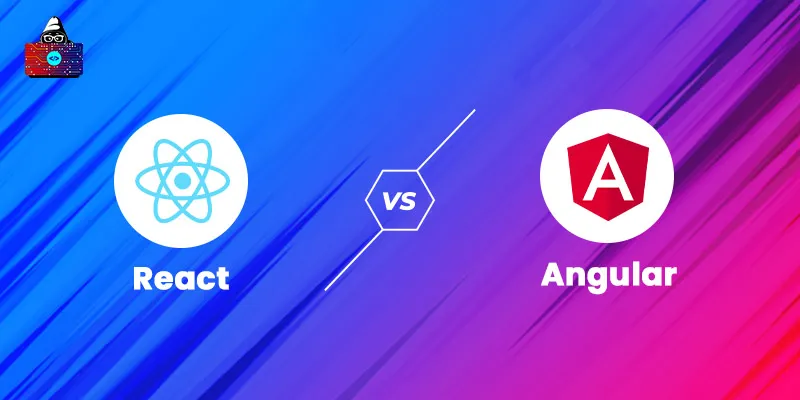The web development industry is growing at a faster pace. React vs Angular is a common topic for discussion among front-end developers. That's because Angular and React are two of the most widely used front-end technologies based on JavaScript that offer everything you need to develop robust and interactive frontends.
The most important difference between the two is that while Angular is a JavaScript framework, ReactJS is a JS library. Although React is a library, it gives a run for money to the popular JavaScript frameworks, and that's why it is usually included in the list of best JavaScript frameworks .
In this article, we will discuss the differences between Angular and React in detail.
React vs Angular: Which One is the Best?
If you are into web development, then you must be aware of the concept of front-end and back-end development. Angular and React facilitate front-end development. You do not need any kind of backend knowledge to learn React and Angular. If you know JavaScript and the other two pillars of front-end - HTML and CSS - then you will be able to understand what we can do with Angular and React. Many people have this misconception that front-end development ends with HTML, CSS, and JavaScript . It's true to a limit, but when you learn frontend in-depth, you realize there is more than CSS and JavaScript. You got libraries and frameworks to develop the frontend, and they are helping with providing an amazing interface to the user. Before going into React vs Angular, we need to understand the difference between a framework and a library.
Comparison between Framework vs Library
We have mentioned above that React is a library, whereas Angular is a TypeScript-based framework. Ok, that sounds good, but what does it actually mean? Let’s discuss. Frameworks and libraries are similar. At the basic level, frameworks and libraries are pre-defined or pre-written codes that we use to perform certain tasks so that we do not need to reinvent the wheel every time. Frameworks and libraries are designed to reduce the code of a program . The basic principles on which frameworks and libraries work are the DRY principle and code reusability. Now the important question to ask is, "How are frameworks different from libraries?" Often people confuse libraries with frameworks and vice-versa. Although both may seem similar, there are many differences. We will not discuss all the differences between frameworks and libraries here. Instead, we will tell you the main difference that lies in their operation. When we use a library, it means that we are calling a bunch of pre-written code in our own program. As such, we don’t need to write additional code every time. While a framework is also a pre-written code, we do not call a framework in our program. Rather, a framework calls our program and plugs it with something else.
What is React?

React, which is also known as React.js and ReactJS, is a JavaScript library. It was created by Jordan Walke while working for Facebook. Now, Facebook maintains React. It was first released in March 2013. Since its release, React has been serving as a great tool for solving frontend problems. The React community is growing rapidly, and it promises many job opportunities in the future for frontend developers.
Some Big Tech Firms Using React:
- Airbnb
- Netflix
- Uber
- Dropbox
What is Angular?

Angular is a JavaScript framework that is written in TypeScript (a scripting language developed by Microsoft that is a superset of JavaScript). The main asset of Angular that makes it so popular is its parent company. Angular was developed by Google, and it was first released in September 2016. There is a term you often hear when you use Angular, which is AngularJS. Do not confuse it with Angular. AngularJS is the old version of Angular. When Angular was rewritten by the same team, then they called it Angular or Angular 2. Therefore, AngularJS is Angular 1, and subsequent versions are Angular.
Some Big Tech Firms Using Angular:
- Upwork
- HBO
- Nike
- Forbes
- Sony
React vs Angular: Head-to-Head Comparison
| Parameters | React | Angular |
| First Released in | 2013 | 2016 |
| Developed by | ||
| Written in | JavaScript | TypeScript |
| Type | Library | Framework |
| DOM (Document Object Model) | React has virtual DOM, which works way faster than the real DOM. | Angular has real DOM. It works similar to virtual DOM for trivial updates, but when we are talking about thousands of updates on HTML tags, it works slow. |
| Popularity | According to Google, React has more searches than Angular. The popularity of React is more than Angular. | Angular is new. It is popular but not as much as React. People like to use React more than Angular. |
| Learning Curve | React has a low learning curve. | Angular is difficult to learn as compared to React. |
| Performance | React has virtual DOM, which makes its performance very fast when it comes to loading and refreshing webpages. | Angular’s MVVM helps to reduce the loading speed of the web pages. |
| Data Binding | It is uni-directional | Angular has bi-directional data binding. |
| Testing | Facebook uses Jest to test the React code. | In Angular, you get the Jasmine framework for code testing. |
| Architecture | React has reusable, cohesive, and modular components. | Angular has cohesive, reusable, and modular components. |
| Documentation | React provides well-managed documentation that undergoes regular updates. | Angular is new in the field, but its documentation is good. |
| Community | It has a vast and growing community. | It also supports a large community. |
What Should a Beginner Choose? React or Angular?
Are you a front-end developer with some experience in HTML, CSS, and JS, and now thinking about what to do next to enhance the front-end skills? In 2022, there are two leading options for front-end development, React and Angular. Though both Angular and React are designed to serve the same purpose, we would suggest choosing React because it is easy to learn. React is way much easier to learn than Angular. React is a library of JS and Angular is a TypeScript framework. Working on a framework is easy, and you get many pre-built tools, but, on the other side, operating and learning a framework could be tedious and difficult, especially if you're a beginner. React is a library that is easy to learn if you know how to work with JavaScript.
Conclusion
That sums up our React vs. Angular discussion. Both are doing great in order to serve as the best way for front-end web development. After comparing both, we have seen that React is a clear winner. Angular is new and needs many updates if it wants to overtake React. In our suggestion, choosing React first would be a great decision if you want to make a career in front-end web development because it offers you more flexibility than Angular. Then again, Angular is also a popular front-end tool. Therefore, you should try it too.
People are also reading:




